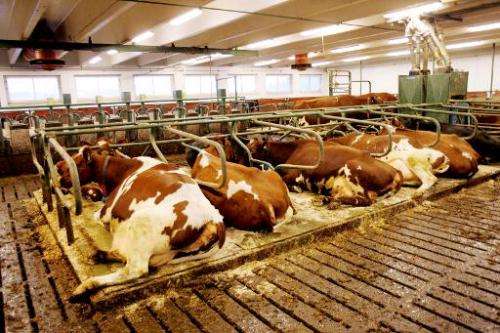Cows are seen in a barn in southern Norway, on January 12, 2006
Norway said Wednesday it had detected a "probable" case of mad cow disease but urged consumers not to panic as it may not be the same variant as the British 1990s epidemic.
A second positive test for bovine spongiform encephalopathy (BSE) on a 15-year-old cow reinforced suspicions that it had mad cow disease, the Norwegian Veterinary Institute said.
"We have a likely and strong suspicion of a possible variant of BSE," Bjoern Roethe Knudtsen of the Food and Safety Authority told public broadcaster NRK.
The authorities however said there was a distinction between the type of BSE caused by cows eating meat-based feed—banned in Europe since 2001 after the British epidemic—and an atypical version which has sporadically appeared in older cows in several European countries in recent years.
A definitive diagnosis can only be made by a European reference laboratory in Britain.
"We take this seriously and we are handling it as if our suspicion were confirmed," Food and Safety Authority official Solfrid Aamdal said in a statement.
The authority stressed that "more and more" BSE cases in Europe are of the atypical kind and that beef and milk consumption remains safe.
The cow's carcass, from a farm in west-central Norway, was destroyed and safety measures put in place for the rest of the herd.
© 2015 AFP



















